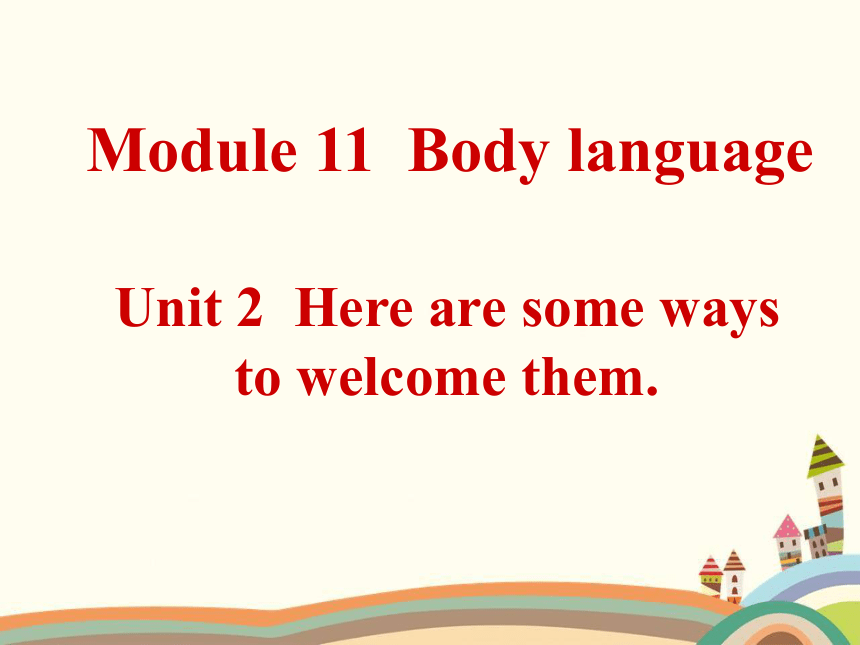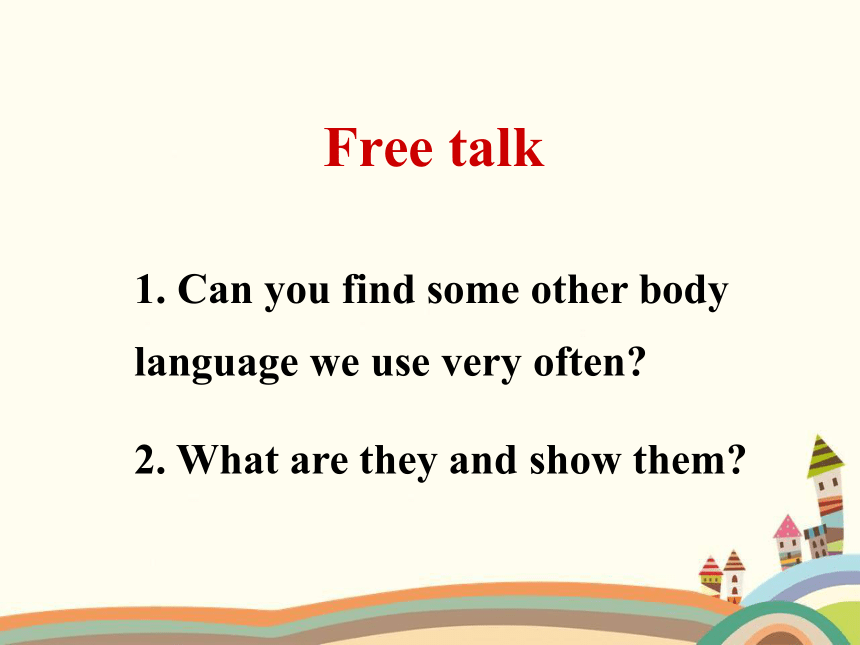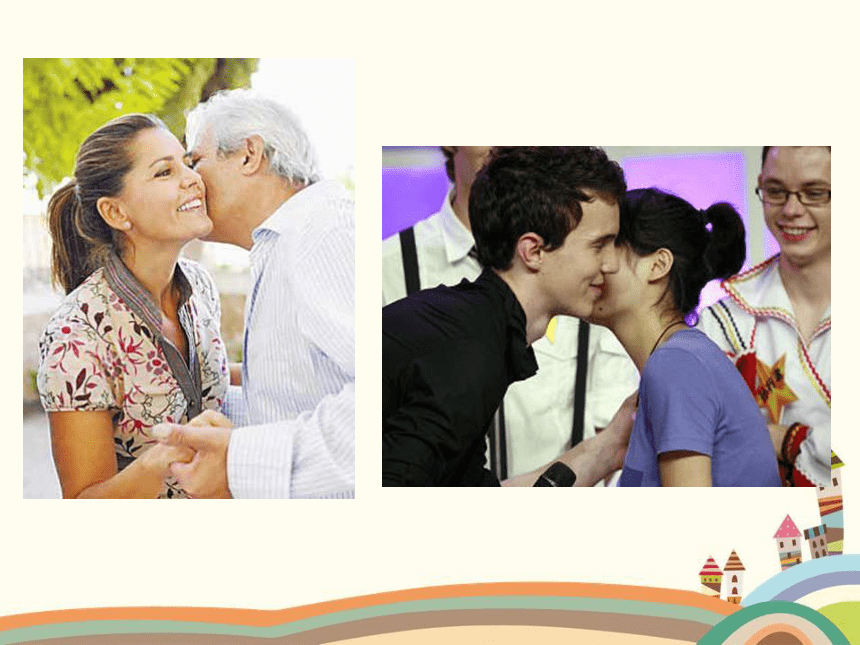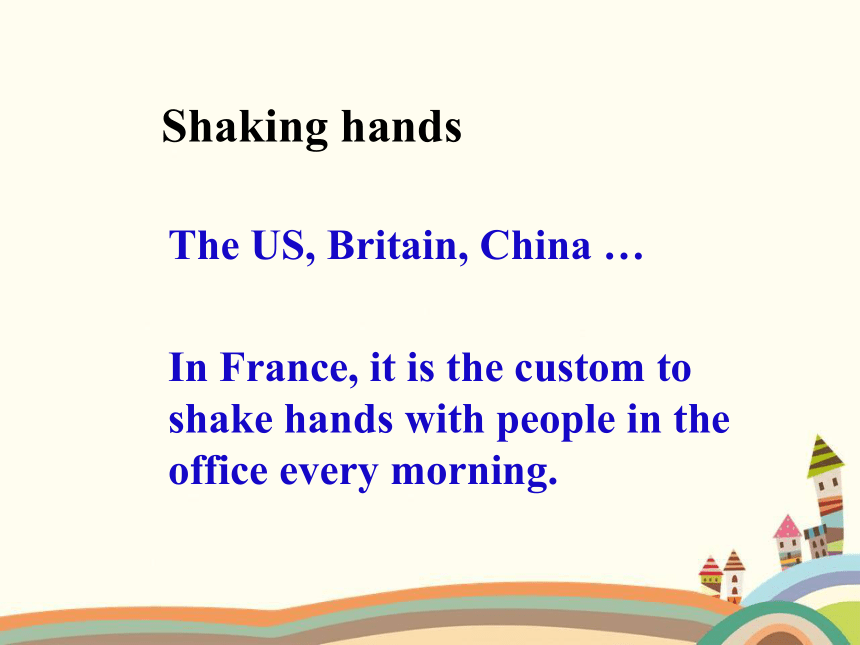外研版Module 11Unit 2 Here are some ways to welcome them课件 (32张)
文档属性
| 名称 | 外研版Module 11Unit 2 Here are some ways to welcome them课件 (32张) |  | |
| 格式 | ppt | ||
| 文件大小 | 1.4MB | ||
| 资源类型 | 教案 | ||
| 版本资源 | 外研版 | ||
| 科目 | 英语 | ||
| 更新时间 | 2022-05-23 09:19:16 | ||
图片预览












文档简介
(共33张PPT)
Module 11 Body language
Unit 2 Here are some ways to welcome them.
oh my god; surprise
Read one’s mind (察言观色).
happy
Read one’s mind (察言观色).
I don’t know.
Read one’s mind (察言观色).
angry
Read one’s mind (察言观色).
say yes / agree
Read one’s mind (察言观色).
1. Can you find some other body language we use very often
2. What are they and show them
Free talk
People around the world have their own ways of greeting each other. Do you know any ways of greeting around the world
Kiss
Some of the South American countries, Russia, France, Arab countries …
Shaking hands
The US, Britain, China …
In France, it is the custom to shake hands with people in the office every morning.
In Thailand, people greet each other by putting their hands together and bowing.
greeting in Japan
a traditional Maori greeting
“kiss” the top of a woman’s hand in west countries
Holland
kissing each other on one cheek and then the other
The USA
shaking hands with
each other
Japan
bowing to each other
Match the country / area with its form of greeting.
The Netherlands
Thailand
South America
the Middle East
putting their hands together and bowing slightly
kissing each other on one cheek and then the other
greeting each other by touching noses
hugging each other
Listen and check the sentences.
1. When you talk to a friend, you can stand close in the Middle East and North Americans.
2. Girls like walking arm in arm with their friends in China.
3. In Britain, people don’t like to touch other people.
4. It isn’t polite to look at people when you talk in the US and Britain.
5. In Greece, it isn’t polite to wave to say goodbye.
×
√
√
×
√
Read the passage and answer the questions.
1. Is body language the same in different countries
2. Is it all right to stand close to people in the Middle East
No, it isn’t.
Yes, it is.
3. Do the British like touching people
4. Do Americans look at people when they talk
5. Do people in Greece wave goodbye
No, they don’t.
Yes, they do.
No, they don’t.
Check the body language you can use in different countries and places.
Stand close Touch each other Look at people when talking
Britain
Middle East
South America
US
√
√
√
√
Language points
1. Here are some ways to welcome them.
here是表示“处所”的副词, 表示“在这里”。常用在动词be之后, 作表语, 表示“在/到这里”。主语可以是表特指的名词、代词、不定代词……等, 有时也可用泛指性的名词词组。如:
Ann is not here.
— Where is my shirt
— It's here.
— Where are they
— They are here.
Is everyone here today
Are we all here
肯定陈述句中, 这种“here”有时也可提前置于句首。主语若为名词, 应引起倒装; 主语若为人称代词, 则“主谓”要用正常语序。这种提前主要是为了强调。如:
Here are some apples。(相当于Some apples are here.)
这有一些苹果。
— Where's my watch
— Is it in your bag
— No, it isn't. Oh, here it is. (— It is here. ) It's in my pencil-box.
若主语为泛指性名词, 还原正常语序时, 应用“There be +主语+here”句型。
Here is an English book.
= There is an English book here.
= An English book is here.
2. Give them more personal space.
personal adj.私人的;个人的
Don't question me about my personal business!
不要问我个人的私事!
Be careful how you start the personal computer.
要注意怎样起动个人计算机。
This is my personal problem.
这是我个人的问题.
3. Chinese girls often walk arm in arm with their friends.
arm in arm 臂挽臂, 挽着手腕地
We often walk along the street arm in arm.
我们经常手挽手地沿着街走。
I saw them walk arm in arm last weekend.
我上周末看到他们手挽走着。
hand in hand 手拉手地
4. In Greece, it’s not at all polite!
not at all (用于否定)一点也不; 不必客气
I am not at all satisfied with this book.
我对这本书一点也不满意。
It's not at all that bad.
这根本没有那么坏。
I'm not at all surprised at the news.
这消息丝毫不使我吃惊。
5. In fact, it’s very rude!
in fact 其实; 事实上 。修饰句子,并且通常放在句首。
In fact, I think you're right.
事实上,我认为你是对的。
In fact, I think an old car is better than none.
事实上,我认为有一辆旧车总比没车强。
He doesn't mind. In fact, he is even pleased.
他不介意,事实上,他甚至很高兴。
rude adj.粗鲁的,无礼的
Don't be so rude to your parents!
别对你的父母这么没礼貌!
It's very rude of her to leave without telling us.
她不向我们打声招呼就走了,这是非常不礼貌的。
It is rude to spit in public.
在公共场合吐痰是粗鲁的。
Some class rules
Stand up when you answer a question in class.
Don’t be late for class.
Be polite to the teacher.
Don’t eat food in class.
No talking while someone else is talking.
Bring all required material l to class.
No eating or drinking in the classroom.
Follow all other school and district rules.
Work in groups. Talk about your class rules.
--- Shall we stand up when we answer a question in class
--- Yes, we shall.
Talk about your school rules.
Module 11 Body language
Unit 2 Here are some ways to welcome them.
oh my god; surprise
Read one’s mind (察言观色).
happy
Read one’s mind (察言观色).
I don’t know.
Read one’s mind (察言观色).
angry
Read one’s mind (察言观色).
say yes / agree
Read one’s mind (察言观色).
1. Can you find some other body language we use very often
2. What are they and show them
Free talk
People around the world have their own ways of greeting each other. Do you know any ways of greeting around the world
Kiss
Some of the South American countries, Russia, France, Arab countries …
Shaking hands
The US, Britain, China …
In France, it is the custom to shake hands with people in the office every morning.
In Thailand, people greet each other by putting their hands together and bowing.
greeting in Japan
a traditional Maori greeting
“kiss” the top of a woman’s hand in west countries
Holland
kissing each other on one cheek and then the other
The USA
shaking hands with
each other
Japan
bowing to each other
Match the country / area with its form of greeting.
The Netherlands
Thailand
South America
the Middle East
putting their hands together and bowing slightly
kissing each other on one cheek and then the other
greeting each other by touching noses
hugging each other
Listen and check the sentences.
1. When you talk to a friend, you can stand close in the Middle East and North Americans.
2. Girls like walking arm in arm with their friends in China.
3. In Britain, people don’t like to touch other people.
4. It isn’t polite to look at people when you talk in the US and Britain.
5. In Greece, it isn’t polite to wave to say goodbye.
×
√
√
×
√
Read the passage and answer the questions.
1. Is body language the same in different countries
2. Is it all right to stand close to people in the Middle East
No, it isn’t.
Yes, it is.
3. Do the British like touching people
4. Do Americans look at people when they talk
5. Do people in Greece wave goodbye
No, they don’t.
Yes, they do.
No, they don’t.
Check the body language you can use in different countries and places.
Stand close Touch each other Look at people when talking
Britain
Middle East
South America
US
√
√
√
√
Language points
1. Here are some ways to welcome them.
here是表示“处所”的副词, 表示“在这里”。常用在动词be之后, 作表语, 表示“在/到这里”。主语可以是表特指的名词、代词、不定代词……等, 有时也可用泛指性的名词词组。如:
Ann is not here.
— Where is my shirt
— It's here.
— Where are they
— They are here.
Is everyone here today
Are we all here
肯定陈述句中, 这种“here”有时也可提前置于句首。主语若为名词, 应引起倒装; 主语若为人称代词, 则“主谓”要用正常语序。这种提前主要是为了强调。如:
Here are some apples。(相当于Some apples are here.)
这有一些苹果。
— Where's my watch
— Is it in your bag
— No, it isn't. Oh, here it is. (— It is here. ) It's in my pencil-box.
若主语为泛指性名词, 还原正常语序时, 应用“There be +主语+here”句型。
Here is an English book.
= There is an English book here.
= An English book is here.
2. Give them more personal space.
personal adj.私人的;个人的
Don't question me about my personal business!
不要问我个人的私事!
Be careful how you start the personal computer.
要注意怎样起动个人计算机。
This is my personal problem.
这是我个人的问题.
3. Chinese girls often walk arm in arm with their friends.
arm in arm 臂挽臂, 挽着手腕地
We often walk along the street arm in arm.
我们经常手挽手地沿着街走。
I saw them walk arm in arm last weekend.
我上周末看到他们手挽走着。
hand in hand 手拉手地
4. In Greece, it’s not at all polite!
not at all (用于否定)一点也不; 不必客气
I am not at all satisfied with this book.
我对这本书一点也不满意。
It's not at all that bad.
这根本没有那么坏。
I'm not at all surprised at the news.
这消息丝毫不使我吃惊。
5. In fact, it’s very rude!
in fact 其实; 事实上 。修饰句子,并且通常放在句首。
In fact, I think you're right.
事实上,我认为你是对的。
In fact, I think an old car is better than none.
事实上,我认为有一辆旧车总比没车强。
He doesn't mind. In fact, he is even pleased.
他不介意,事实上,他甚至很高兴。
rude adj.粗鲁的,无礼的
Don't be so rude to your parents!
别对你的父母这么没礼貌!
It's very rude of her to leave without telling us.
她不向我们打声招呼就走了,这是非常不礼貌的。
It is rude to spit in public.
在公共场合吐痰是粗鲁的。
Some class rules
Stand up when you answer a question in class.
Don’t be late for class.
Be polite to the teacher.
Don’t eat food in class.
No talking while someone else is talking.
Bring all required material l to class.
No eating or drinking in the classroom.
Follow all other school and district rules.
Work in groups. Talk about your class rules.
--- Shall we stand up when we answer a question in class
--- Yes, we shall.
Talk about your school rules.
同课章节目录
- Module 1 Lost and found
- Unit 1 Whose bag is this?
- Unit 2 Are they yours?
- Unit 3 Language in use
- Module 2 What can you do ?
- Unit 1 I can play the piano
- Unit 2 I can run really fast
- Unit 3 Language in use
- Module 3 Making plans
- Unit 1 What are you going to do at the weekends?
- Unit 2 We're going to cheer the players.
- Unit 3 Language in use
- Module 4 Life in the future
- Unit 1 Everyone will study at home
- Unit 2 Every family will have a small plane.
- Unit 3 Language in use
- Module 5 Shopping
- Unit 1 What can I do for you?
- Unit 2 You can buy everything on the Internet
- Unit 3 Language in use
- Module 6 Around town
- Unit 1 Could you tell me how to get to the Nationa
- Unit 2 The London Eye is on your right.
- Unit 3 Language in use
- Revision module A
- Module 7 My past life
- Unit 1 I was born in a small village.
- Unit 2 I was born in Quincy.
- Unit 3 Language in use
- Module 8 Story time
- Unit 1 Once upon a time….
- Unit 2 Goldilocks hurried out of the house.
- Unit 3 Language in use
- Module 9 Life history
- Unit 1 He left school and began work at the age of
- Unit 2 He decided to be an actor.
- Unit 3 Language in use
- Module 10 A holiday journey
- Unit 1 What did you do?
- Unit 2 This morning we took a walk.
- Unit 3 Language in use
- Module 11 Body language
- Unit 1 They touch noses!
- Unit 2 Here are some ways to welcome them.
- Unit 3 Language in use
- Module 12 Western music
- Unit 1 It's so beautiful!
- Unit 2 Vienna is the centre of European classical
- Unit 3 Language in use
- Revision module B
